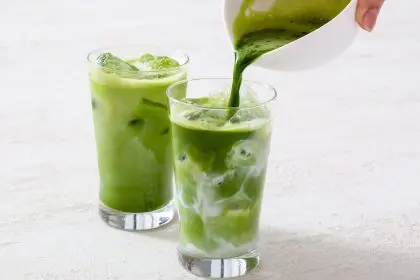In the crisp autumn air, the aroma of pumpkin spice wafts from coffee shops and bakeries, signaling the arrival of fall. But this beloved seasonal blend offers more than just a comforting flavor. Recent research suggests that the spices in this mixture may provide unexpected health benefits, making it a worthwhile addition to your diet year-round.
What’s in your latte? The makeup of pumpkin spice
Pumpkin spice, contrary to popular belief, doesn’t actually contain any pumpkin. Instead, it’s an aromatic blend typically consisting of cinnamon, nutmeg, ginger, cloves, and allspice. Each of these spices brings its own set of potential health benefits to the table, creating a mixture that’s as good for your body as it is pleasing to your palate.
Antioxidant powerhouse: Fighting free radicals
One of the most significant advantages of pumpkin spice lies in its antioxidant content. These natural compounds play a crucial role in protecting the body from harmful free radicals, which are unstable molecules that can damage cells and contribute to chronic diseases.
Studies have shown that the antioxidant activity in spices often surpasses that of many fruits and vegetables. This means that sprinkling pumpkin spice on your morning oatmeal or adding it to your coffee might do more than just enhance the flavor – it could provide a substantial antioxidant boost to your diet.
The cinnamon in pumpkin spice, for instance, contains polyphenols, a type of antioxidant that has been linked to lower risk of heart disease. Cloves, another key component, have been found to have one of the highest concentrations of antioxidants among spices.
Inflammation fighter: Spicing away chronic diseases
Chronic inflammation is increasingly recognized as a key factor in many health issues, from arthritis to heart disease. The spices in pumpkin spice blend, particularly ginger and cloves, have demonstrated anti-inflammatory properties in various studies.
Ginger contains a compound called gingerol, which has been shown to inhibit certain inflammatory pathways in the body. Cloves, on the other hand, contain eugenol, a natural anti-inflammatory agent that may help alleviate pain and swelling.
By incorporating pumpkin spice into your diet, you might be giving your body additional tools to combat chronic inflammation, potentially reducing your risk of inflammation-related diseases.
Blood sugar regulation: A spicy approach to diabetes management
For those watching their blood sugar levels, pumpkin spice might offer an unexpected ally. Cinnamon, a primary component of the blend, has been the subject of numerous studies examining its effects on blood glucose.
Some research suggests that cinnamon may improve insulin sensitivity and help lower blood sugar levels. While it’s not a replacement for medical treatment, adding cinnamon-rich pumpkin spice to foods might be a flavorful way to support blood sugar management.
Health organizations have begun to recognize the potential benefits of spices like cinnamon for people with diabetes. Using pumpkin spice as a flavoring agent could be a smart alternative to sugar or artificial sweeteners for those looking to manage their blood glucose levels.
Heart health: Spicing up cardiovascular wellness
Cardiovascular disease remains a leading cause of death worldwide, but dietary choices can play a significant role in prevention. Interestingly, regions with diets high in spices often report lower rates of heart disease.
The anti-inflammatory and antioxidant properties of pumpkin spice components may contribute to heart health in several ways. Cinnamon, for example, has been associated with reduced levels of total cholesterol, LDL cholesterol, and triglycerides.
Ginger, another key player in the pumpkin spice blend, may help lower blood pressure and reduce the risk of blood clots. While more research is needed to fully understand these effects, incorporating pumpkin spice into a heart-healthy diet could be a flavorful way to support cardiovascular wellness.
Digestive aid: Soothing stomachs with spice
Many of the spices in pumpkin spice have long histories of use in traditional medicine for digestive issues. Ginger, in particular, has been extensively studied for its effects on nausea and vomiting.
Research has shown that ginger can be effective in alleviating morning sickness in pregnant women and reducing nausea associated with chemotherapy. Other spices in the blend, such as cinnamon and cloves, have carminative properties, which means they may help reduce bloating and gas.
Adding pumpkin spice to your diet could potentially provide some relief from common digestive discomforts, making it a tasty and natural way to support gut health.
Low-calorie flavor booster: Spicing up weight management
One of the most practical benefits of pumpkin spice is its ability to add flavor to foods without significantly increasing calorie content. A teaspoon of pumpkin spice typically contains less than 10 calories, making it an excellent option for those looking to enhance the taste of their meals without derailing their dietary goals.
Moreover, some studies suggest that certain spices might have metabolism-boosting properties. Cinnamon, for instance, has been associated with increased thermogenesis – the production of heat in the body – which could potentially aid in weight management.
By using pumpkin spice to add flavor to foods, individuals might find it easier to stick to healthier eating habits, potentially supporting weight management efforts.
Incorporating pumpkin spice beyond the latte
While pumpkin spice lattes have become a fall staple, there are numerous ways to incorporate this healthful blend into your diet year-round:
- Sprinkle it on yogurt or oatmeal for a nutritious breakfast boost
- Add it to smoothies for an antioxidant-rich flavor kick
- Use it as a rub for lean meats to create flavorful, low-calorie meals
- Mix it into baked goods as a partial replacement for sugar
- Stir it into warm milk for a comforting, caffeine-free evening drink
Moderation and safety considerations
While pumpkin spice offers numerous potential health benefits, it’s important to consume it in moderation. Some individuals may be sensitive to certain spices, and excessive consumption can lead to side effects.
For instance, large amounts of cinnamon may interact with certain medications, and some people may experience digestive discomfort from high doses of ginger. Pregnant women should consult with their healthcare providers before significantly increasing their intake of any spices.
As with any dietary change, it’s wise to start with small amounts and observe how your body responds. If you have any concerns or pre-existing health conditions, consult a healthcare professional before making significant changes to your diet.
Conclusion: A spice blend worth savoring
Pumpkin spice, once relegated to seasonal treats, is emerging as a potentially healthful addition to the diet. From its antioxidant properties to its potential effects on heart health and blood sugar regulation, this aromatic blend offers more than just comfort and nostalgia.
By incorporating pumpkin spice into a balanced diet, individuals may be able to enjoy both its distinctive flavor and its potential health benefits. As research continues to uncover the effects of various spices on human health, the humble pumpkin spice blend may find itself moving from the realm of seasonal indulgence to that of year-round wellness support.
So the next time you reach for that pumpkin spice latte or sprinkle the blend on your morning toast, remember that you might be doing more than just satisfying a craving – you could be taking a small step towards better health.















